I'm travelling from Zurich to Berlin for a long weekend. Why? No, not for business, just to taste some good wines with a few friends. Wine tourism! It's not even about drinking, but rather about enjoying, tasting and sampling selected wines. Special rarities? Wines that you dream of "drinking once in a lifetime"? No, not that either. Why, for heaven's sake, am I flying 850 kilometres north to wines that have been grown and vinified some 800 kilometres south of me? Is it worth it?
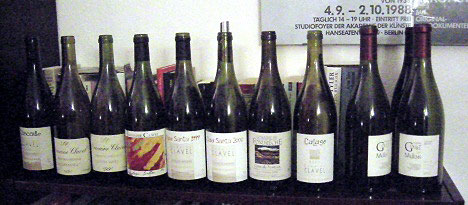 |
| Are so many wines from cult winemaker Pierre Clavel (Languedoc) really worth the trip? |
Yes, because where, how and with whom one drinks wine - or even just tastes it - is probably not entirely irrelevant. For one thing, there is the composition, the order, so to speak, the environment of a wine, its neighbourhood when tasting. "Verticals" are particularly popular, that is, tasting the same wines from different (as many as possible) vintages immediately after each other. So it is certainly worthwhile to go somewhere, to the wines, from time to time.
But then the question quickly arises: "with whom?", so to speak, the "friends and/or fellow sufferers" with whom one shares the experience of a wine immediately after tasting, the echo from the moment, so to speak. There are also sympathies and antipathies towards wine, just like in life.
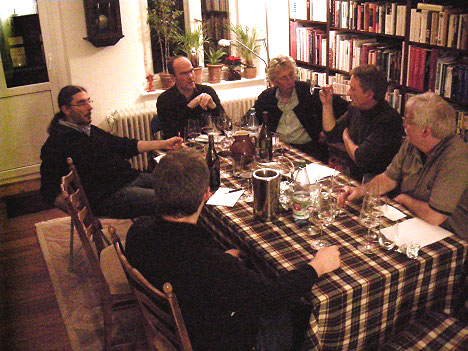 |
| Berlin wine round on the trail of the Copa Santa |
And finally, how one enjoys wine is not entirely irrelevant. Whether you drink it with a meal or not; whether you drink a lot of the same wine or only a little; whether you just "taste" and then spit or whether you mainly explore the wine with your eyes, nose and palate; whether you simply let the first sip define you or try to honour the wine with points; whether you attach importance to rituals and an atmospheric environment or simply fill your glass without much fuss. All of this is much more important for the wine lover than simply having drunk the wine somewhere, sometime. That's why I often and gladly travel to taste wine, even if it is almost 2,000 kilometres away from its origin. Perhaps it is precisely the distance that can give the wine a different, new character.
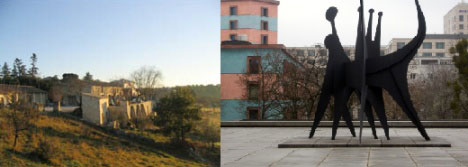 |
| Two places - two worlds. Languedoc and Berlin |
Languedoc in Berlin, Châteauneuf-du-Pape, Graz, Bordeaux, Cologne, German Riesling on the southern Rhone. I have experienced all this (and much more) and - I admit it - enthusiastically participated in it. Wine, bottled, knows no borders (with the exception of customs barriers). No, wine is international and - unfortunately only a few think about this - carries the culture, the climate, the landscape, the way of life of a region into the world. Wherever you drink a particular wine (which still betrays the individuality of a wine region or a winemaker), you often encounter distant worlds. Here in the middle of wintry Berlin, I suddenly think I hear the Provençal hymn I last encountered in May on a Rhone boat in Avignon, sung by the vintners from Rasteau (www.youtube.com/watch?v=nENDpq7p52g).
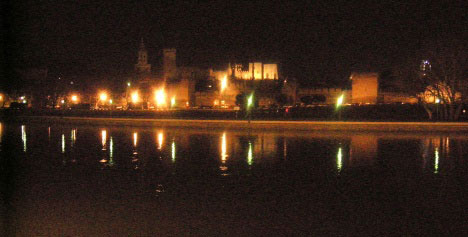 |
| Avignon at night on a Rhone cruise by the winegrowers of Rasteau% accompanied by the hymn Coupo Santo. |
"Copou Santo e versanto - vuejo an bord plen - erste vuejo - lis estrambord - e di forts", is the refrain, in Provençal, difficult to translate and probably only to understand with a cultural-historical background: "Coupe Sainte - et débordante, verse à pleins bords - verse à flots les enthousiasmes - et l'énergie des forts". Just like this song, wine can carry a mood, a spirit, a feeling, a piece of history into the world. "Coupo Santo", the sacred chalice, actually the "sacred wine vessel", symbolises the autonomy and strength of Provence in that it once gave the Catalan poet, Victor Balaguer - fighter against the politics of Isabelle d'Espagne - an exile, a new home.
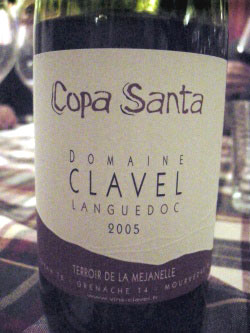 |
| "Copa Santa"% the wine of winemaker Pierre Clavel% a cult wine for its name alone. |
When I now taste a top wine from the Languedoc in Berlin, which is called "Copa Santa" in reference to the most popular folk song of the French south, the whole south moves north to Berlin with this wine.
When I think beyond the wine and its qualities, it is not simply nine wines, from nine different years, that I have there in the glass and that I compare with each other; to which I assign qualities, characteristics, features, (in silence) even points. It is far more a term that is used so often and thoughtlessly, usually also very technocratically, by the wine lover: "terroir", as the geographical, geological and meteorological conditions of a particular vineyard site. In a figurative sense, terroir is also culture, namely the culture in which a wine is created: this certainly includes geological and meteorological features, but far more so the human being who also makes wines precisely under these conditions.
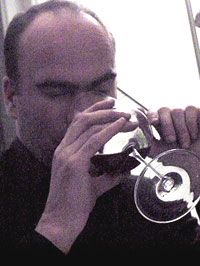 |
| Critical examination at the "Copa Santa" tasting in Berlin. |
And so, for a few hours, a completely different terroir moves into Berlin. Admittedly, only there, in the room where the tasting took place. Only there, where Provence and the spirit of "Coupo Santo" were also perceived. This, expressed geographically, is worth a Zurich-Berlin trip. And only in this way can wine tourism become a wine experience.
Cordially
Yours/Yours